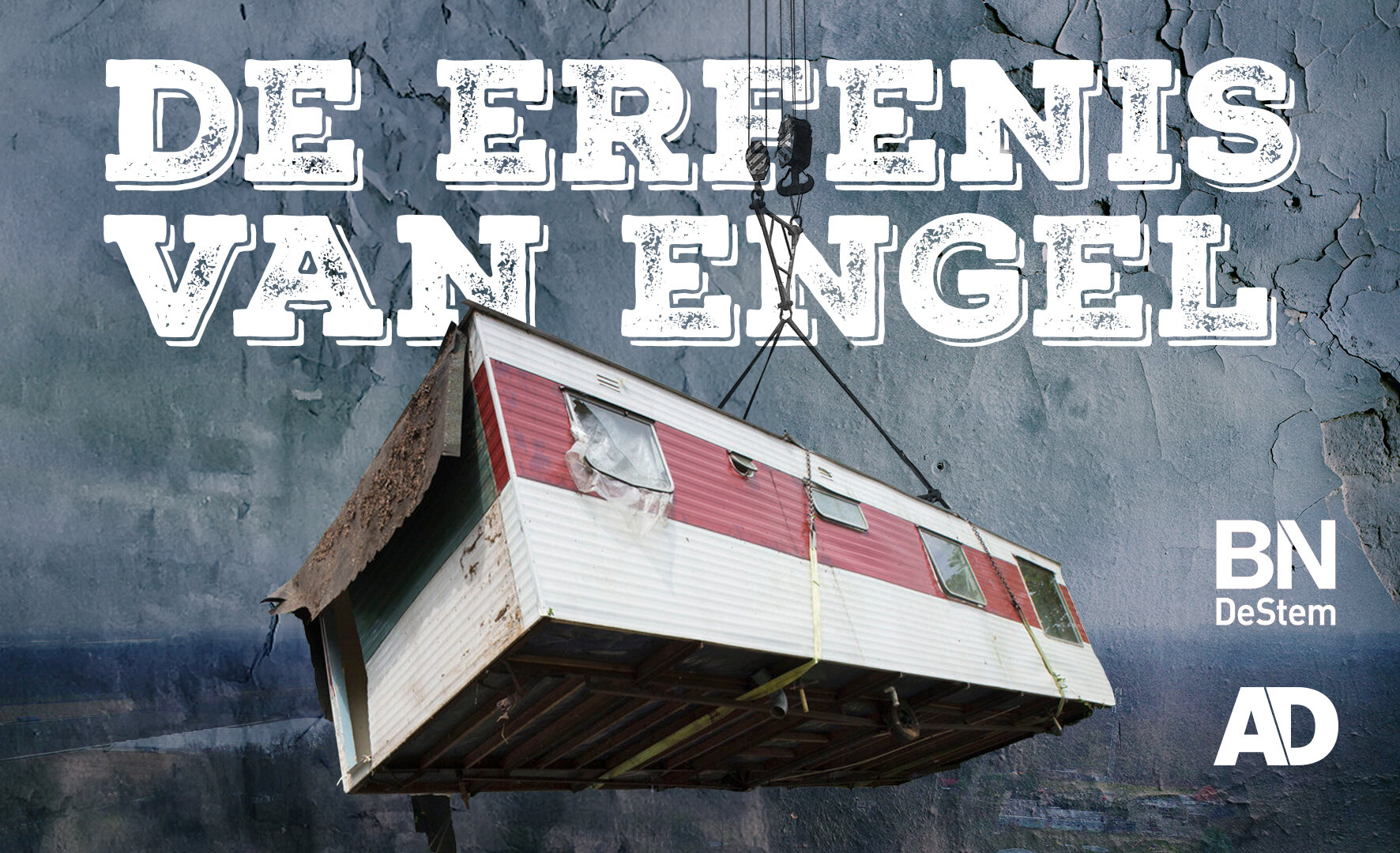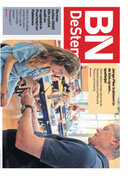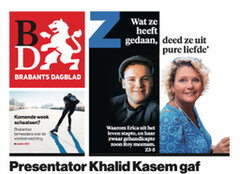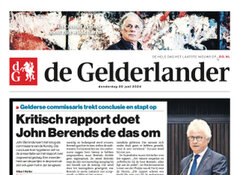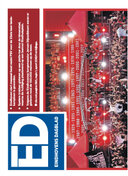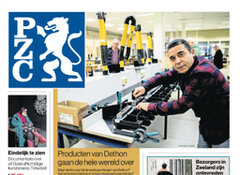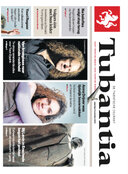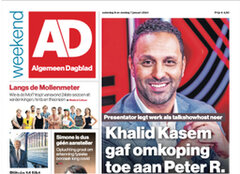Management crisis in the Municipality of Roosendaal due to misconduct by executive councillor
How do you deal with anonymous sources in a delicate matter?
Journalists frequently receive tips about misconduct and try to establish the facts, by submitting a Woo (Open Government Act) request, for instance. If that is not possible, a story based on anonymous sources may be necessary. But when is that allowed?

A
n executive councillor who suddenly resigns because she “feels unsafe” as a result of the behaviour of “some fellow councillors”; this is something that we, as regional reporters, don’t often experience. Within a few days, the departure of Sanneke Vermeulen, executive councillor for the VVD party, led to a major management crisis this year within the Municipality of Roosendaal, which I follow for BN DeStem.
With the help of more than 12 anonymous sources, we then managed to do within two days what had failed in the previous months: prove that another executive councillor (Arwen van Gestel of the local VLP party) had been misbehaving towards colleagues for some time. After we had given him the opportunity to reply to our publication, he decided to resign with immediate effect.
In recent years, I had often received reports about Van Gestel from tip-off sources. But it remained incredibly difficult to get those directly involved to talk about the situation. Officials do not like to leak information, particularly if it is possible for the employer to trace who has spoken.
This is why we submitted a Woo (Open Government Act) request in the spring. But this did not confirm enough in our view. There were emails, a factual report and advice about a conflict between Van Gestel and an official, but we were not allowed to see the contents. According to the local authority, even anonymised, the information would encroach too much on the “personal privacy” of those involved.
Officials do not like to leak information, particularly if it is possible for the employer to trace who has spoken
But when Vermeulen contacted us within six months with the message that she would be leaving because of “an unsafe work environment”, it was not difficult to guess what had caused this. Maybe people would now be willing to talk, even it was anonymously.
We explicitly asked our readers for tips in all our publications on the matter.
In doing so, we also made use of the whistleblower platform ‘Publeaks’, where people can share information with the press completely anonymously. This resulted in us receiving dozens of tips, all of which, with a few exceptions, were about Van Gestel.
Things really took off when, within 24 hours of Vermeulen’s departure, we were able to confirm that Van Gestel had pressured the VVD party’s board to force Vermeulen to resign. Thanks to a reliable tip-off source very close to the Municipal Executive, we were able to confirm the majority of the stories.
We now had at least 12 sources that we considered to be very reliable, but they were all anonymous. Given the number of tips, the severity of the facts that we could substantiate and because of their current news value, we felt justified in going ahead with the publication. We gave Van Gestel more than four hours to respond. He instead chose to announce his resignation.
Letter of resignation
The danger of a publication like this, based on anonymous information, is that the reader will come to see the reporter as the one making the accusations. It is of course true that the article was not complete: people who had good experiences with Van Gestel will not have come forward as tip-off sources. In matters such as this in which intimidation and insults are involved, those who did come forward inevitably have a personal interest as well.
Were we being used to divert attention from her own poor performance?
In addition, there were major political interests in deciding what information would and would not make it into our columns. This is one of the reasons that we were immediately suspicious of Vermeulen’s letter of resignation. Were we being used to divert attention from her own poor performance? There had been rumours about that for some time and it was an open secret that the relationship with her own party was difficult, to say the least.
We had immediately confronted her with critical questions on this. And in the period after her resignation, we worked hard to get to the bottom of that side of the story. This was once again possible with the help of anonymous but reliable sources.
Freek Lieve Verhulst
Read the entire story
luisteren
A regional podcast with nationwide exposure
You don’t necessarily have to be in Amsterdam or The Hague for a good journalistic story with nationwide impact. Rijsbergen is also an excellent location to achieve this, as we noticed over the past year.
Our podcast ‘De Erfenis van Engel’ (Engel’s Legacy) not only attracted a lot of attention and listeners in West Brabant, but also far beyond. It resulted in nationwide exposure for this subject matter. For those who do not immediately recognise the name Engel: Cees Engel was the eccentric owner of the most notorious campsite in the Netherlands, Fort Oranje in Rijsbergen. It was a hotbed of crime, social misery and prostitution. Cees is also the father of Willem Engel, the Dutch activist who founded the controversial organisation Viruswaarheid.
The mission was a success: highlighting the story of the Engel family and Fort Oranje from as many angles as possible.
Reason enough for us at BN DeStem to reflect proudly on what was a new kind of project for our editorial team. And substantiation that regional journalism can have nationwide impact.
André Trompers
Editor-in-chief of BN DeStem

More contact with the public via the pop-up editorial team
Project teams are trying to resuscitate a neighbourhood in Breda with bags of money. You would think this is much needed if you read the reports on our app, website or in the newspaper. Firework riots on New Year’s Eve, explosions at schools – this is not one of the city’s best neighbourhoods.
But is it really that bad in Hoge Vucht, a neighbourhood in the north of Breda? Our conclusion during an editorial team meeting was that we don’t actually know. Our reporters don’t have a large network there. The neighbourhood consists of a number of closed multicultural communities.
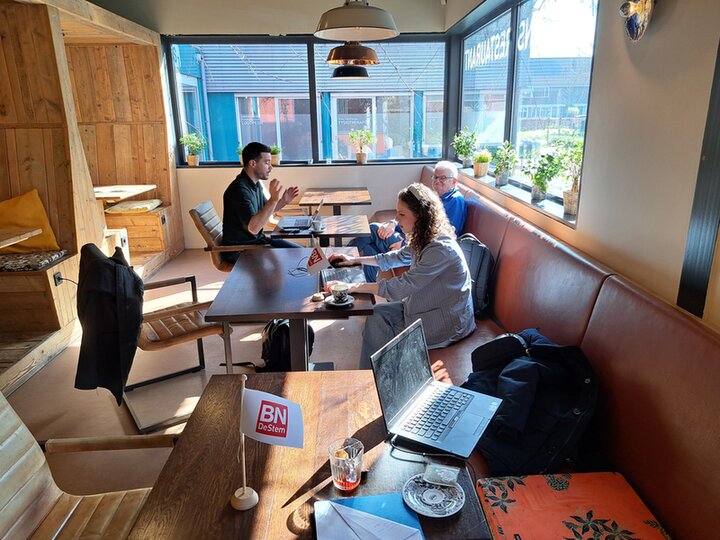
What if we were to embrace the neighbourhood for a longer period of time? We decided to establish a pop-up editorial team. We were welcome in the community centre and that is where our reporters did their work. Every day for three weeks under the heading ‘Hier Hoge Vucht’. The goal: to determine what is going well in the neighbourhood and what could be improved. It has resulted in warm encounters and constructive articles. People living in the neighbourhood approach us every day to tell us their stories about the neighbourhood. Valuable stories for the short term, but above all an investment in lasting contacts.
It has been the impetus at BN DeStem for more contact with the public. A pop-up editorial team in a recently renovated neighbourhood in Bergen op Zoom, a weekly walk-in session in Dongen, a walk-in session in Sint Willebrord, an interactive cycling holiday throughout the region, etc. To be continued in 2025.
Tom Hayes

ADR Nieuwsmedia zit in de haarvaten van Nederland
Algemeen Dagblad en de zeven regionale titels van DPG Media vormen één groep: ADR Nieuwsmedia. Binnen deze grootste nieuwsorganisatie van Nederland wordt nauw samengewerkt. Hoe gebeurt dat?
We vragen het onze abonnees in Gelderland, Brabant, Twente of Zeeland elk jaar opnieuw, maar we kennen het antwoord: zij lezen onze sites, apps en kranten vooral vanwege het regionale nieuws. Dat geldt trouwens niet alleen voor lezers uit die genoemde streken. Ook de AD-lezers in en rond Den Haag, Utrecht of Rotterdam zetten ‘lokaal nieuws’ bovenaan hun lijstje van favoriete artikelen. Meteen daaronder staat vaak hun favoriete voetbalclub.
Het enorme belang dat abonnees stellen in nieuws uit hun eigen buurt deed kranten decennia geleden besluiten zich te concentreren op de beste regionale verslaggeving. Voor zaken als binnenlandse politiek, buitenland, economie, cultuur of topsport bundelden ze de krachten in gemeenschappelijke persdiensten. Zo ontstonden de Zuid-Oost Pers, de GPD en de Wegener Persdienst. Die laatste persdienst verdween toen DPG Media tien jaar geleden de regionale kranten van Wegener kocht. AD en de zeven regionale kranten werken sindsdien samen in ADR Nieuwsmedia.
Samenwerken
Een centrale redactie met 200 journalisten van het AD en de samenwerkende titels in de regio, verzorgt vanuit Rotterdam het (inter)nationale nieuws. Zodat De Gelderlander zich kan richten op de eigen provincie en de PZC zich alleen bezig hoeft te houden met Zeeland.
De stroom nieuws gaat niet alleen van Rotterdam naar de regio, maar ook omgekeerd. Als er in Eindhoven of Enschede iets groots gebeurt, delen het ED en Tubantia dit nieuws onmiddellijk met het AD en de andere regionale titels. Het maakt ADR, zeker buiten de Randstad, tot een van de snelste nieuwsorganisaties en zeker de meest wijdvertakte. Want ADR beschikt over ruim 800 journalisten en een netwerk van lokale correspondenten. ADR zit in de haarvaten van Nederland.
Leidt dit tot eenheidsworst? Allerminst. Het nieuws uit Oost-Nederland beheerst de homepage van de Stentor, dat uit de regio Breda de voorpagina van BN DeStem – en zo verder. De lay-out van ADR-kranten en -online-platforms komen overeen, de inhoud verschilt sterk, want elke titel maakt eigen, onafhankelijke keuzes. De eigenheid en uniciteit van de unieke regionale verslaggeving bepaalt immers het succes van een titel. Ruim 900.000 abonnees en bijna vijf miljoen online bezoekers zijn er dagelijks blij mee.
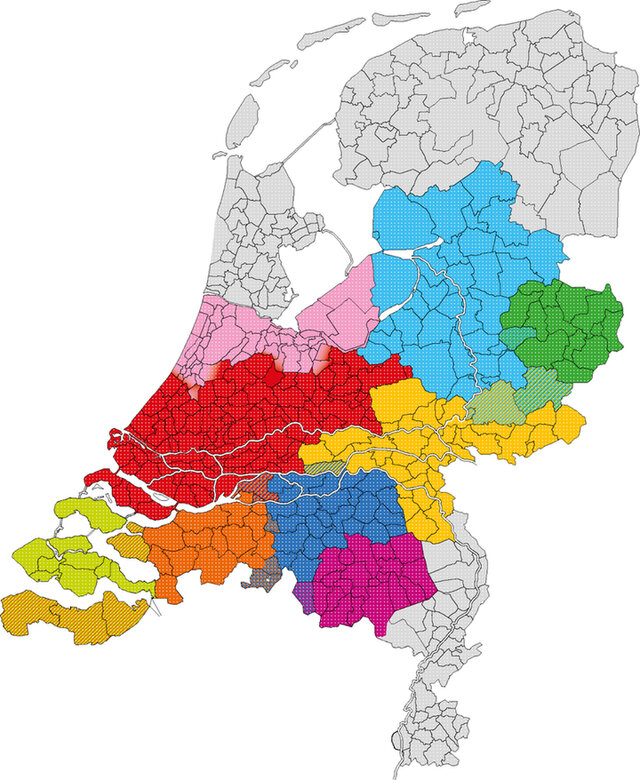
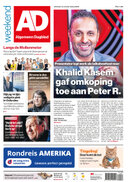
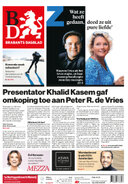
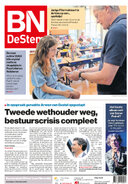
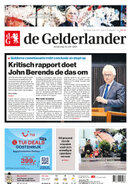

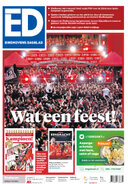
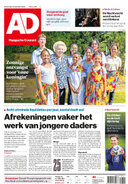
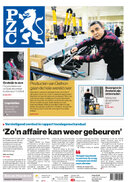
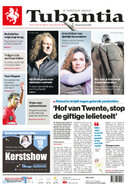
De regionale titels in Nederland
Ad Regio
de Stentor
Tubantia
De Gelderlander
Brabants Dagblad
Eindhovens Dagblad
BN DeStem
PZC
AD Landelijk
Kies jouw locatie
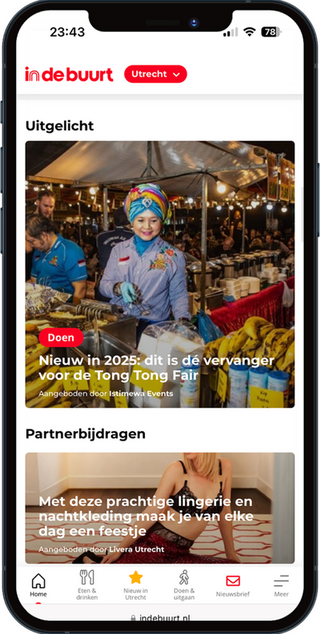
indebuurt.nl
Sinds een aantal jaren maakt ook indebuurt.nl onderdeel uit van ADR. Het gratis platform richt op alles wat een stad leuk maakt voor haar inwoners en is sterk gericht op het bieden van service. Zo geeft indebuurt.nl bezoekers informatie over nieuwe winkels, over uitgaan, activiteiten in de stad en bijzondere plekken. Inwoners worden uitgenodigd de redactie van tips te voorzien, of vrijblijvend teksten, foto’s of video’s aan te leveren. De makers van ‘indebuurt’ hebben de ambitie om gebruikers nauwer bij het stadsleven te betrekken.
indebuurt.nl is actief in 34 steden, vooral in plaatsen waar ook ADR-titels actief zijn. Artikelen van indebuurt.nl staan daarom ook op de sites en apps van de regionale titels van ADR en enkele malen per week in de gedrukte kranten. Per maand bezoeken ruim 2,5 miljoen mensen een van de secties. Daarmee staat ‘indebuurt’ in de top 10 van nieuwssites in Nederland.
Journalistiek & techniek
ADR-redacties maken gebruik van technische innovaties op het gebied van automatisering en kunstmatige intelligentie (AI). Het gebruik van spellingscorrectie is bijvoorbeeld al sinds jaar en dag ingeburgerd. Het is per definitie een journalist die bepaalt welk onderwerp wordt opgepakt en of wat er wordt gepubliceerd. AI wordt – nu nog experimenteel – gebruikt om teksten van bijvoorbeeld persberichten snel samen te vatten of tot een kort artikel te verwerken. Daarnaast kan AI ook suggesties doen voor spelling, grammatica, koppen en ideeën voor verhalen. De journalist bepaalt of suggesties worden overgenomen. We noemen deze werkwijze het mens-machine-mens-principe.
De redactie gebruikt automatisering het meest voor serviceberichten, zoals lokale weerberichten voor alle 342 gemeenten in Nederland. Als de verwachting is dat de temperatuur daalt van 2 naar -2, staat er een zin klaar die deze data-informatie vertaalt naar bijvoorbeeld ‘het gaat vriezen’ of ‘het kwik daalt onder nul’. De redactie vermeldt bij dit soort berichten dat ze automatisch zijn samengesteld. Automatisering kan ook worden gebruikt om op basis van data voor alle gemeenten in Nederland berichten te maken over bijvoorbeeld de afname van het gebruik van zonnepanelen of de toename van winkelleegstand. Het is een gespecialiseerde journalist die hiervoor data verzamelt en een basisbericht schrijft, eventueel aangevuld met andere bronnen. De techniek helpt ons om daar voor elke gemeente een eigen versie van te maken.
Cijfers
achter AD en de regionale titels
Gemiddeld dagelijks bereik
Het dagelijks bereik is een veelgebruikte indicatie van de impact die digitale journalistiek heeft. Maandbereik wordt ook weergegeven in de nationale monitors, maar daarin spelen eenmalige bezoekers van de sites een relatief grote rol.
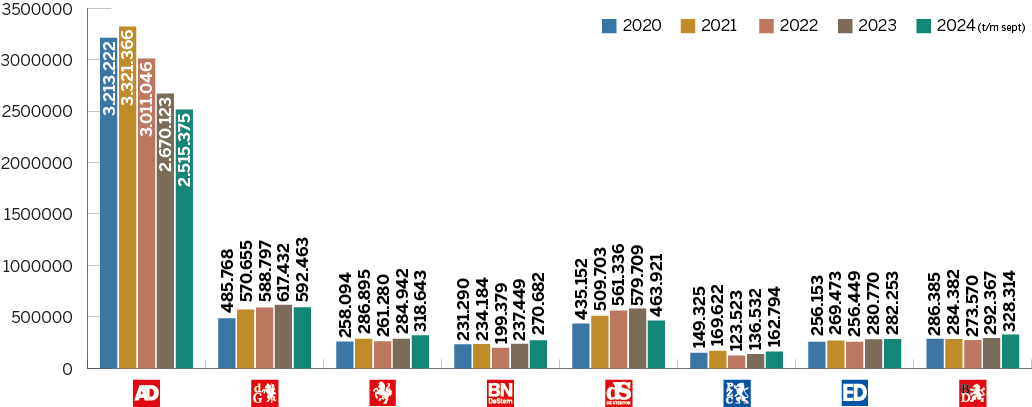
Journalisten in vaste dienst in 2024
Dit geeft de omvang van de redactie weer, omgerekend in voltijds banen (fte). Het zijn zowel de verslaggevers als de chefs, eindredacteuren, vormgevers, beeldredacteuren, video- en podcastmakers en onlineredacteuren. Om het beeld zuiver te houden zijn de freelance journalisten niet opgenomen. Die leveren eveneens een belangrijke bijdrage in de vorm van artikelen, columns, beeld, audio en video. Het zijn er soms honderden per titel. Aantal en werkzaamheden fluctueren van jaar tot jaar.

Meer info
Gemiddeld aantal unieke artikelen per dag
Dit is de hoeveelheid eigen artikelen die elke redactie produceert, van groot tot klein. De meeste redacties publiceren meer dan dat: bijvoorbeeld artikelen van de centrale redactie in het geval van de regionale kranten, of (in België) artikelen van collega-titels die worden doorgeplaatst. Die zijn niet meegeteld, net zo min als de kleine lokale berichten die automatisch worden gemaakt (zoals het weer en 112-berichten), of de doorgeplaatste artikelen van ‘Indebuurt’. Zo ontstaat het zuivere cijfer van wat de eigen redactie dagelijks maakt.

Meer info
Betalende abonnees
Dit is de som van papieren, digitale en hybride abonnementen. Het is het gemiddelde aantal over het desbetreffende jaar.

Rapportcijfers van eigen abonnees
Dit cijfer wordt gegeven door deelnemers aan een jaarlijks lezersonderzoek dat voor de meeste titels wordt gehouden.

Vertrouwenscijfer uit onderzoek
Dit cijfer is afkomstig uit recent onderzoek naar merkvertrouwen in opdracht van DPG Media. Daarbij geeft een algemeen publiek, dus niet alleen abonnees of bezoekers, vertrouwen in verschillende nieuwsmedia aan op een schaal van 0 (helemaal niet betrouwbaar) tot 10 (uiterst betrouwbaar). Daarnaast worden abonnees uitgesplitst, die hun titel doorgaans meer dan gemiddeld vertrouwen. Deze onderzoeksmethode en de uitkomsten komen overeen met die van het jaarlijkse Digital News Report van het Reuters Institute in Oxford. De Nederlandse en Vlaamse gemiddelde vertrouwenscijfers liggen in die monitor hoger dan die van nieuwsmedia in de omringende Europese landen.
Algemeen publiek
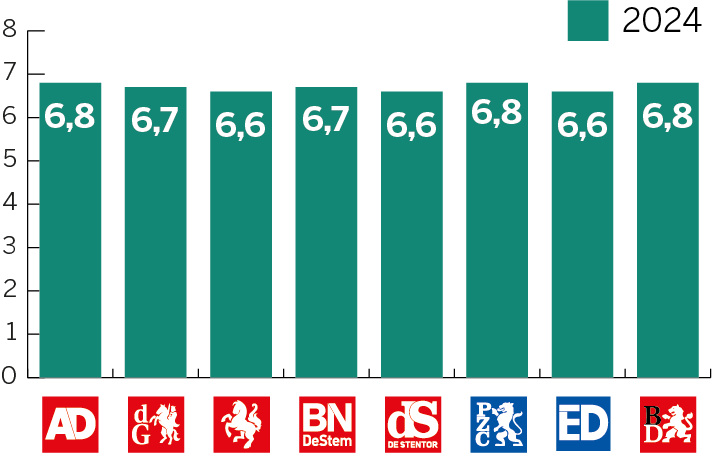
Abonnees
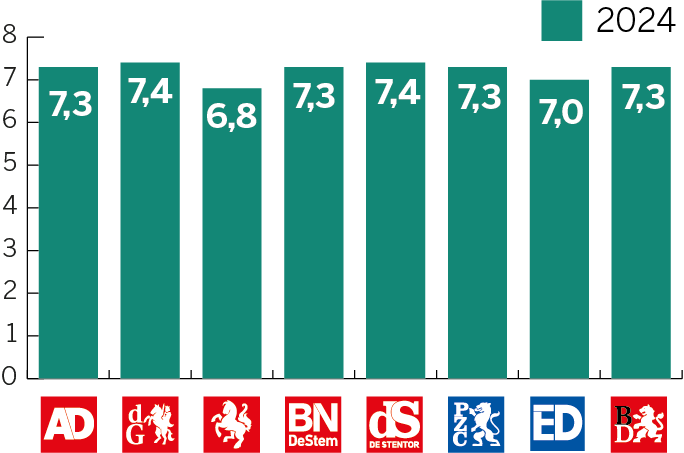
Aantal podcastafleveringen per jaar van alle titels
Deze cijfers geven aan hoeveel podcasts er door de verschillende titels zijn ontwikkeld.
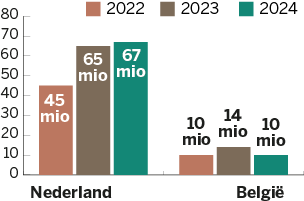
Gemiddeld aantal unieke video's per dag
Deze cijfers geven aan hoeveel video's er door de verschillende titels zijn ontwikkeld.
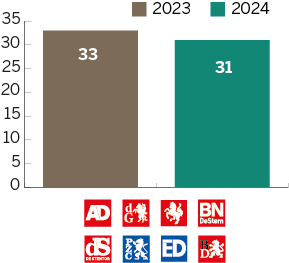
Dagelijks bereik
Gemiddeld dagelijks bereik
Het dagelijks bereik is een veelgebruikte indicatie van de impact die digitale journalistiek heeft. Maandbereik wordt ook weergegeven in de nationale monitors, maar daarin spelen eenmalige bezoekers van de sites een relatief grote rol.

Betalende abonnees
Betalende abonnees
Dit is de som van papieren, digitale en hybride abonnementen. Het is het gemiddelde aantal over het desbetreffende jaar.

Rapportcijfer van abonnees
Rapportcijfers van eigen abonnees
Dit cijfer wordt gegeven door deelnemers aan een jaarlijks lezersonderzoek dat voor de meeste titels wordt gehouden.

Journalisten in vaste dienst
Journalisten in vaste dienst in 2024
Dit geeft de omvang van de redactie weer, omgerekend in voltijds banen (fte). Het zijn zowel de verslaggevers als de chefs, eindredacteuren, vormgevers, beeldredacteuren, video- en podcastmakers en onlineredacteuren. Om het beeld zuiver te houden zijn de freelance journalisten niet opgenomen. Die leveren eveneens een belangrijke bijdrage in de vorm van artikelen, columns, beeld, audio en video. Het zijn er soms honderden per titel. Aantal en werkzaamheden fluctueren van jaar tot jaar.

Meer info
Unieke artikelen per dag
Gemiddeld aantal unieke artikelen per dag
Dit is de hoeveelheid eigen artikelen die elke redactie produceert, van groot tot klein. De meeste redacties publiceren meer dan dat: bijvoorbeeld artikelen van de centrale redactie in het geval van de regionale kranten, of (in België) artikelen van collega-titels die worden doorgeplaatst. Die zijn niet meegeteld, net zo min als de kleine lokale berichten die automatisch worden gemaakt (zoals het weer en 112-berichten), of de doorgeplaatste artikelen van ‘Indebuurt’. Zo ontstaat het zuivere cijfer van wat de eigen redactie dagelijks maakt.

Meer info
Vertrouwenscijfer uit onderzoek
Vertrouwenscijfer uit onderzoek
Dit cijfer is afkomstig uit recent onderzoek naar merkvertrouwen in opdracht van DPG Media. Daarbij geeft een algemeen publiek, dus niet alleen abonnees of bezoekers, vertrouwen in verschillende nieuwsmedia aan op een schaal van 0 (helemaal niet betrouwbaar) tot 10 (uiterst betrouwbaar). Daarnaast worden abonnees uitgesplitst, die hun titel doorgaans meer dan gemiddeld vertrouwen. Deze onderzoeksmethode en de uitkomsten komen overeen met die van het jaarlijkse Digital News Report van het Reuters Institute in Oxford. De Nederlandse en Vlaamse gemiddelde vertrouwenscijfers liggen in die monitor hoger dan die van nieuwsmedia in de omringende Europese landen.
Algemeen publiek
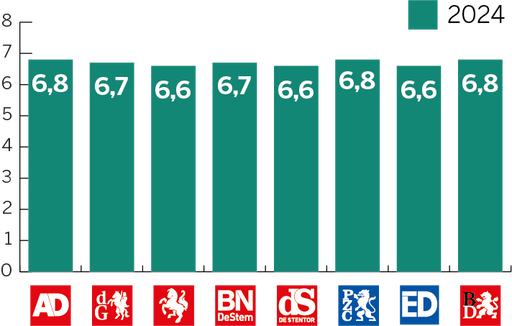
Abonnees
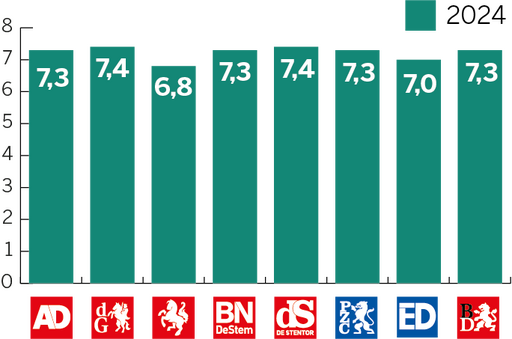
Aantal podcastafleveringen
Aantal podcastafleveringen per jaar van alle titels
Deze cijfers geven aan hoeveel podcasts er door de verschillende titels zijn ontwikkeld.

Aantal unieke video's
Gemiddeld aantal unieke video's per dag
Deze cijfers geven aan hoeveel video's er door de verschillende titels zijn ontwikkeld.

